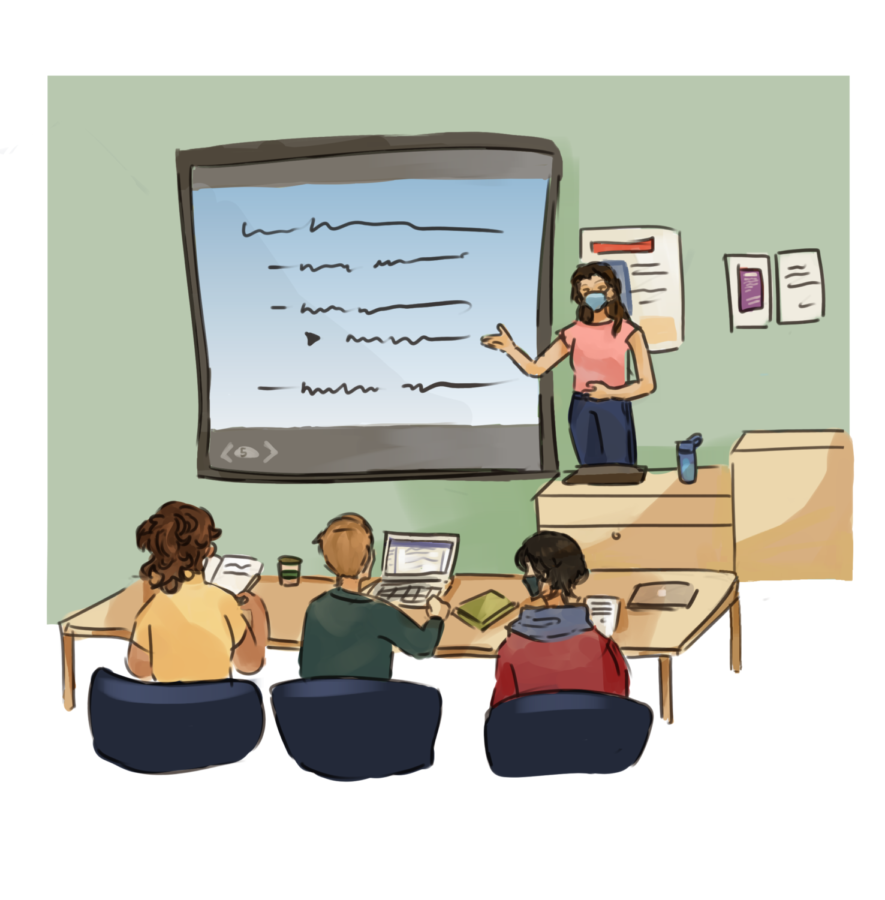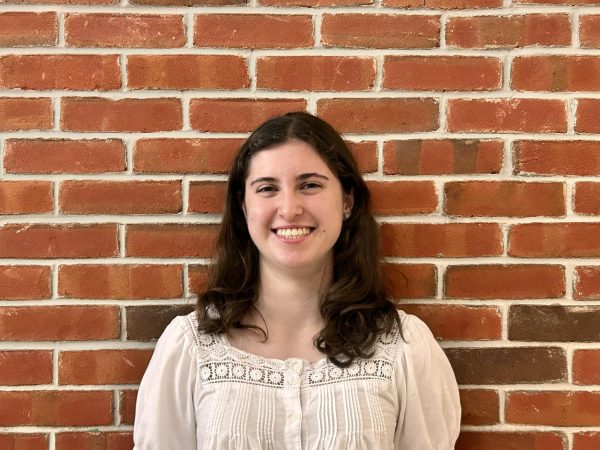Students take classes at Montgomery College
Additional courses have been added to RM’s Course Catalog that explore culture, sexuality and languages of varying cultures.
November 30, 2021
At a 2021 dual enrollment (DE) interest meeting, MCPS Career Post-secondary Partnerships Supervisor Genevive Floyd expressed her hopes for high school students to get involved in college courses.
These courses are offered by Montgomery College [MC] in partnership with MCPS. The students can attend college classes in their high school [HS], online or on the MC campus.
DE students take both HS and college courses concurrently. Many of their college courses count as HS credits, allowing them to graduate on time with college courses on their transcript and work their way towards an associate’s degree. Students typically start in junior year with just a couple of college courses, adding more as the year progresses.
DE students generally enroll in Core Education classes. “Students are taking 101 [introductory level] classes or general education requirements that pretty much transfer over seamlessly to different colleges,” RM DE Program Advisor (DEPA) Evan Anderson said. For example, some students decide to do a dual credit in English by taking English at MC in their senior year, earning a HS English credit simultaneously because the course is accepted on both HS and college transcripts.
DE students are able to get ahead in their college careers. “Our students are able to earn advanced level credit on their high school transcript, get a less costly college education and save time towards their college degree,” Ms. Floyd said. HS students can receive reduced tuition prices for up to four college courses.
Many students enroll in DE to explore various fields and career opportunities not available at their HS. “I have a lot of kids who take Introduction to Business, for instance, because we don’t offer any business classes here,” Ms. Anderson said. Junior DE student Lena Williams is taking Administration of Justice.
Students first hear about DE in a variety of different ways, whether from school announcements, word of mouth by counselors or teachers, or through older siblings.
The DE application is tedious and can feel overwhelming at first. “It took me weeks because it was a lot of personal information to fill out,” Williams said. “You have to choose your classes and then do an abbreviated schedule.” DE students do not have a full seven class schedule as they typically take four regular high school classes, but only one or two college courses at a time.
School counselors and the RM DEPA help with the many steps and levels of approval that must be obtained before a student is eligible to take college courses. “I give them the logistics of how you apply to MC and then how you select your classes as a DE student,” Ms. Anderson said. “Your parent, counselor and principal have to approve.”
Although the application can be a lot, acceptance into DE is worth it. “Once you hit that ‘you’re in’ status, you’re really just so happy with yourself because you’re like, ‘I did it,’” Sierra said.
Class schedules for DE students vary greatly from student to student. “For this semester, it’s fully online. But next semester, I’m going to be hybrid,” junior DE student Sophia Ubiera said. Williams is staying virtual.
DE students come to school later than other students, usually around 8:30 a.m. “I get to sleep in and that’s awesome,” Ubiera said.
The students spend the first three periods of the day together in the media center, attending their college classes on Zoom. They then spend the last four periods attending their normal high school classes.
However, the college courses do not meet every day and off-days are used to catch up on work or study ahead.
Another option offered by MC is the early college program [EC], which allows HS students to graduate with both a HS diploma and an associate’s degree. After applying in sophomore year, they spend junior and senior year taking only college courses. EC students attend in-person classes at MC.
Junior Annabelle Sierra is one of these students and has her classes all in the morning.
Sierra is able to get a taste of life as a college student.“ I go to the campus like an hour early because I like to really breathe and settle into the campus life,” Sierra said. “I hang out with my friends, do homework, settle in within that hour.”
Sierra enjoys the hard-working mentality of her peers. “There’s two quiet floors so you know that everybody around you is doing work,” said Sierra. “It’s a wonderful environment because you’re around people that also want what you want.”
Sierra attends classes in a cohort of other high school students, so there is not a lot of interaction with the actual college students.
Although she is technically an RM student, Sierra does not feel connected to the RM community and now that she no longer attends the RM campus, she has lost relationships with many RM students. “One of the negatives is probably feeling that disconnection from friends that you had before,” Sierra said.
As a DE student, Ubiera feels a lack of connection with the MC community due to the online format of classes but hopes to become more immersed when the campus opens back up to the DE program.
Contrary to popular belief, the college courses taken are not that much harder than high school courses. Instead, the expectations are on a higher scale.
“You need to know that you’re going to be spending hours studying, doing homework,” Sierra said. “That extra time you get after school is not goof-off time.”
These new expectations can be overwhelming at first, but students get used to them quickly. “You have to be aware that you can handle it. It’s just going to be scary for the first couple of weeks,” Sierra said. “ It’s more hands-off for the professors and more you need to take the reins and really control your learning.”
College-level courses focus less on small practice assignments, and more on bigger projects, some of which take the entire semester and are worth a large portion of the final grade. “It’s a lot less busywork than you might see in high school,” Ms. Anderson said.
College courses can be much less interactive than high school lessons as there are a lot of lectures. “I feel like you have to be prepared for the teachers talking at you,” Sierra said.
Fortunately, Sierra developed a good relationship with one of her professors. “They’re so good at teaching and you absorb all the information and you’re just so enriched in the environment,” Sierra said.
Sierra also feels that professors are sensitive to the fact that their DE students are used to taking classes with a high-school-level set of expectations. “The people who are running the program are really thinking about the students,” Sierra said.
MC and MCPS look for qualified, understanding individuals when choosing professors for these programs. “We have partners who truly care about our students so in MC there are many supports in place to help you and enable you to succeed,” Ms. Floyd said.
Students and staff alike who are involved in the EC and DE programs strongly recommend it to other students. However, they are mindful of the fact that it takes a certain type of student to be successful in a college course environment.
“I would recommend it to other students, but they need to be wary about their schedules and how they feel about their work ethic,” Sierra said. “If you need that extra reminder or a helping hand a lot, it might be easier just to stay in high school and then build your way up.”
Being a part of this program is also time-consuming. “There’s a lot of kids who are in like, dive team or in certain things they love, but they’re not spending as much time on it as they used to because they have all this work,” Sierra said.
However, staff are confident that with the right mindset, students can be successful. “You really just need to be highly motivated and you’ll do just fine,” Ms. Floyd said.
Students taking college courses love it. It gives them a sense of independence and self-understanding that they do not get normally. “You feel more confident in yourself because you’re learning more about you — how you learn, how you focus on information, how you communicate — because you’re the one emailing your professors. You’re the one who’s reaching out,” Sierra said.
If you are a student who is interested in these programs, talk to your counselor or to Ms. Anderson.



